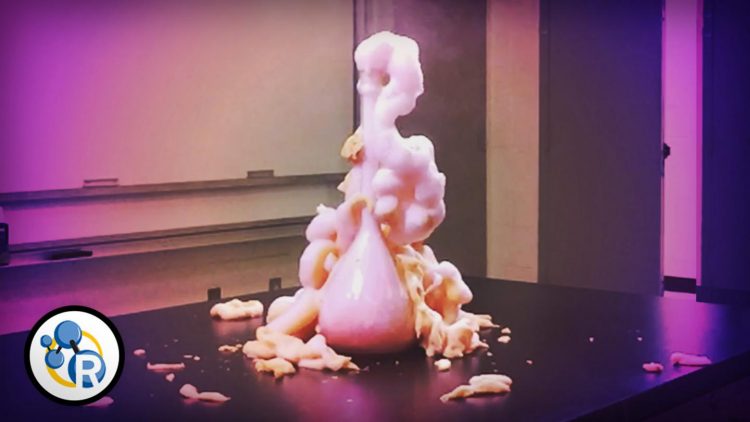Foam explosion in super slow motion (video)

You might have seen this wacky experiment in a chemistry class or on late-night TV. Dropping a mixture into some hydrogen peroxide produces a huge foamy flume. But what's actually causing that big mess? Turns out it's a great illustration of a key concept in chemistry. In this week's video, Reactions teams up with chemistry professor Matt Hartings, Ph.D., to explain the Elephant Toothpaste experiment. Check it out here: https://youtu.be/PX7TIqAJRSY. Credit: The American Chemical Society
Dropping a mixture into some hydrogen peroxide produces a huge foamy flume. But what's actually causing that big mess?
Turns out it's a great illustration of a key concept in chemistry.
In this week's video, Reactions teams up with chemistry professor Matt Hartings, Ph.D., to explain the Elephant Toothpaste experiment.
Check it out here: https:/
###
Subscribe to the series at http://bit.
The American Chemical Society is a nonprofit organization chartered by the U.S. Congress. With more than 158,000 members, ACS is the world's largest scientific society and a global leader in providing access to chemistry-related research through its multiple databases, peer-reviewed journals and scientific conferences. Its main offices are in Washington, D.C., and Columbus, Ohio.
To automatically receive news releases from the American Chemical Society, contact newsroom@acs.org.
Media Contact
All latest news from the category: Life Sciences and Chemistry
Articles and reports from the Life Sciences and chemistry area deal with applied and basic research into modern biology, chemistry and human medicine.
Valuable information can be found on a range of life sciences fields including bacteriology, biochemistry, bionics, bioinformatics, biophysics, biotechnology, genetics, geobotany, human biology, marine biology, microbiology, molecular biology, cellular biology, zoology, bioinorganic chemistry, microchemistry and environmental chemistry.
Newest articles

Innovative vortex beam technology
…unleashes ultra-secure, high-capacity data transmission. Scientists have developed a breakthrough optical technology that could dramatically enhance the capacity and security of data transmission (Fig. 1). By utilizing a new type…

Tiny dancers: Scientists synchronise bacterial motion
Researchers at TU Delft have discovered that E. coli bacteria can synchronise their movements, creating order in seemingly random biological systems. By trapping individual bacteria in micro-engineered circular cavities and…

Primary investigation on ram-rotor detonation engine
Detonation is a supersonic combustion wave, characterized by a shock wave driven by the energy release from closely coupled chemical reactions. It is a typical form of pressure gain combustion,…



